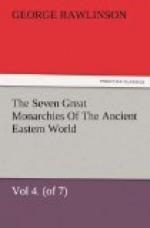Notices agreeing with these, but of less importance, are contained in Herodotus and Strabo. Herodotus speaks of the Chaldaeans as “priests;” Strabo says that they were “philosophers,” who occupied themselves principally in astronomy. The latter writer mentions that they were divided into sects, who differed one from another in their doctrines. He gives the names of several Chaldaeans whom the Greek mathematicians were in the habit of quoting. Among them is a Seleucus, who by his name should be a Greek.
From these various authorities we may assume that there was in Babylon, as in Egypt, and in later Persia, a distinct priest class, which enjoyed high consideration. It was not, strictly speaking, a caste. Priests may have generally brought up their sons to the occupation; but other persons, even foreigners (and if foreigners, then a fortiori natives), could be enrolled in the order, and attain its highest privileges. It was at once a sacerdotal and a learned body. It had a literature, written in peculiar language, which its members were bound to study. This language and this literature were probably a legacy from the old times of the first (Turano-Cushite) kingdom, since even in Assyria it is found that the literature was in the main Turanian, down to the very close of the empire. Astronomy, astrology, and mythology were no doubt the chief subjects which the priests studied; but history, chronology, grammar, law, and natural science most likely occupied some part of their attention. Conducting everywhere the worship of the gods, they were of course scattered far and wide through the country; but they had certain special seats of learning, corresponding perhaps in some sort to our universities, the most famous of which were Erech or Orchoe (Warka), and Borsippa, the town represented by the modern Birs-i-Nimrud. They were diligent students, not wanting in ingenuity, and not content merely to hand down the wisdom of their ancestors. Schools arose among them; and a boldness of speculation developed itself akin to that which we find among the Greeks. Astronomy, in particular, was cultivated with a good deal of success; and stores were accumulated of which the Greeks in later times understood and acknowledged the value.
In social position the priest class stood high. They had access to the monarch: they were feared and respected by the people; the offerings of the faithful made them wealthy; their position as interpreters of the divine will secured them influence. Being regarded as capable of civil employment, they naturally enough obtained frequently important offices, which added to their wealth and consideration.




